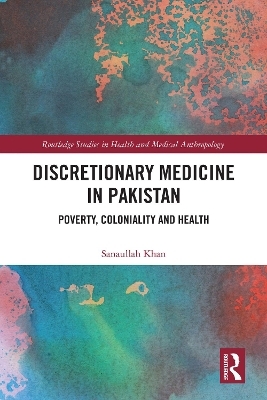
Discretionary Medicine in Pakistan
Poverty, Coloniality and Health
Seiten
2024
Routledge (Verlag)
978-1-032-60020-8 (ISBN)
Routledge (Verlag)
978-1-032-60020-8 (ISBN)
- Lieferbar (Termin unbekannt)
- Versandkostenfrei innerhalb Deutschlands
- Auch auf Rechnung
- Verfügbarkeit in der Filiale vor Ort prüfen
- Artikel merken
This book uses the notion of ‘discretionary medicine’ to explore the landscape of contemporary healthcare in Pakistan.
This book uses the notion of “discretionary medicine” to explore the landscape of contemporary healthcare in Pakistan. It considers how patients frequently experience health interventions as out of touch with the suffering of everyday life and how healthcare provisions are viewed as intrusive, corrupted, and lacking in empathy towards the sick. The study focuses on mental health, acknowledging that the experience of mental illness in Pakistan is increasingly inseparable from conditions of chronic poverty caused directly by deepening inequality. The chapters address the establishment of priorities by the Pakistani healthcare system in conjunction with global disease programs and investigate the misalignments between the priorities of global institutes and local expectations/realities. It is argued that the discretionary nature of medicine is caused by the remnants of colonial-era laws, which link the maintenance of public health with questions of security. This, the author suggests, frequently contributes to forms of care that are riddled with bureaucratic violence. Using a combination of archival and ethnographic research, the book offers a multi-sited and interdisciplinary perspective on healthcare, ranging from care within low-income households and neighborhoods to diasporic communities and state institutions. It will be of interest to scholars and students of medical/psychiatric anthropology, global health, and history of medicine, as well as South Asian and Pakistan studies.
This book uses the notion of “discretionary medicine” to explore the landscape of contemporary healthcare in Pakistan. It considers how patients frequently experience health interventions as out of touch with the suffering of everyday life and how healthcare provisions are viewed as intrusive, corrupted, and lacking in empathy towards the sick. The study focuses on mental health, acknowledging that the experience of mental illness in Pakistan is increasingly inseparable from conditions of chronic poverty caused directly by deepening inequality. The chapters address the establishment of priorities by the Pakistani healthcare system in conjunction with global disease programs and investigate the misalignments between the priorities of global institutes and local expectations/realities. It is argued that the discretionary nature of medicine is caused by the remnants of colonial-era laws, which link the maintenance of public health with questions of security. This, the author suggests, frequently contributes to forms of care that are riddled with bureaucratic violence. Using a combination of archival and ethnographic research, the book offers a multi-sited and interdisciplinary perspective on healthcare, ranging from care within low-income households and neighborhoods to diasporic communities and state institutions. It will be of interest to scholars and students of medical/psychiatric anthropology, global health, and history of medicine, as well as South Asian and Pakistan studies.
Sanaullah Khan is an assistant professor of medical anthropology at the University of Akron.
Introduction
1 Medicine, coloniality and social difference
2 Cold War Politics, bureaucracies and the birth of Pakistani Public Health
3 Prisons, Bureaucratic violence and the Uses of Psychiatry in Pakistan
4 Public health, punishment and chronicity
5 Displacement, Criminalization and Health
6 Transitory Health
Conclusion
| Erscheinungsdatum | 14.11.2024 |
|---|---|
| Reihe/Serie | Routledge Studies in Health and Medical Anthropology |
| Zusatzinfo | 11 Halftones, black and white; 11 Illustrations, black and white |
| Verlagsort | London |
| Sprache | englisch |
| Maße | 156 x 234 mm |
| Gewicht | 490 g |
| Themenwelt | Studium ► 1. Studienabschnitt (Vorklinik) ► Med. Psychologie / Soziologie |
| Studium ► Querschnittsbereiche ► Prävention / Gesundheitsförderung | |
| Naturwissenschaften ► Biologie ► Humanbiologie | |
| Naturwissenschaften ► Geowissenschaften ► Geografie / Kartografie | |
| Sozialwissenschaften ► Ethnologie | |
| Sozialwissenschaften ► Soziologie ► Spezielle Soziologien | |
| ISBN-10 | 1-032-60020-9 / 1032600209 |
| ISBN-13 | 978-1-032-60020-8 / 9781032600208 |
| Zustand | Neuware |
| Informationen gemäß Produktsicherheitsverordnung (GPSR) | |
| Haben Sie eine Frage zum Produkt? |
Mehr entdecken
aus dem Bereich
aus dem Bereich


